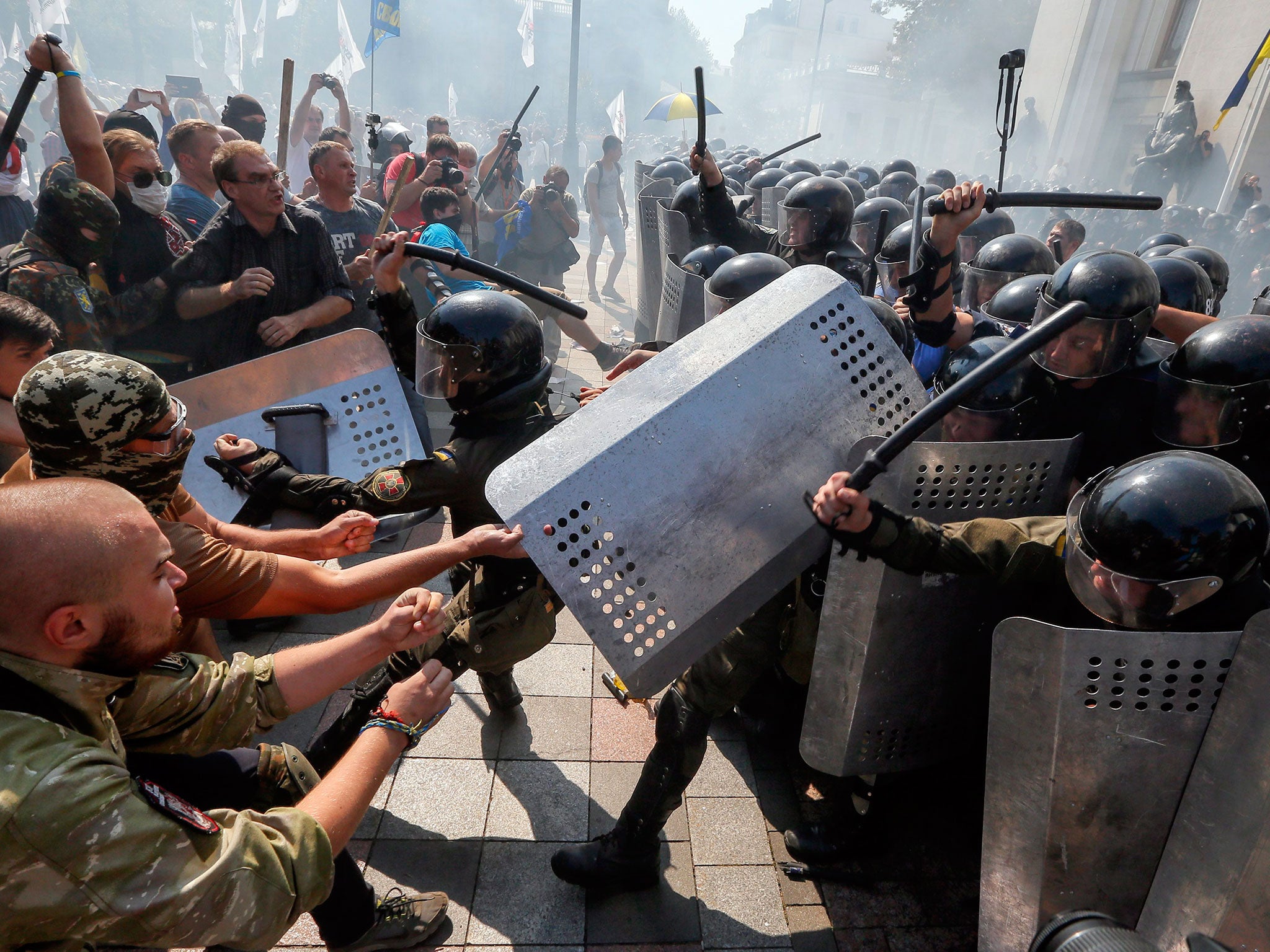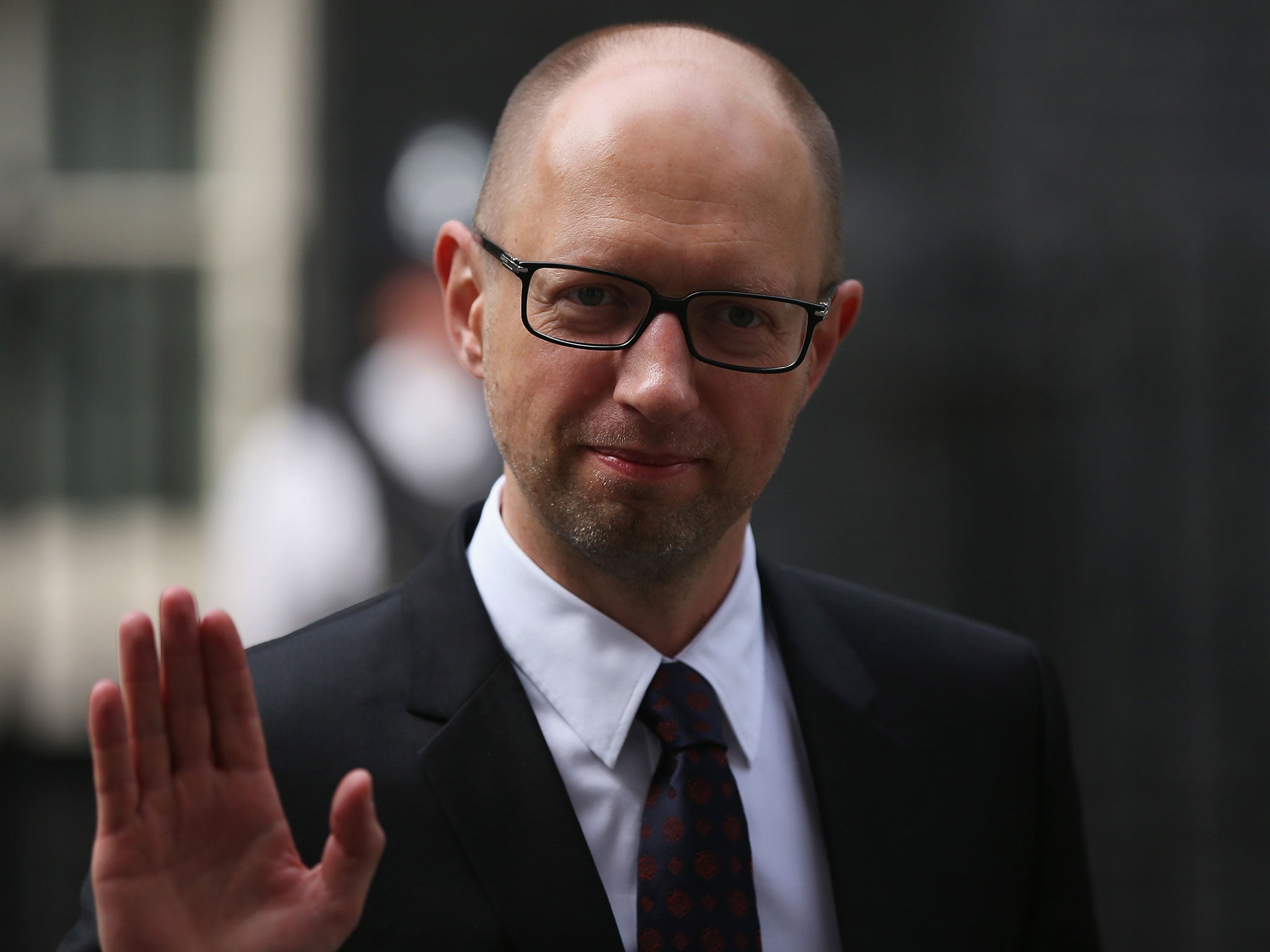Ukraine crisis: Prime Minister says nationalist protesters are worse than the separatists following violence that left one dead
As MPs voted on a contentious bill to try to bring peace to the country and grant concessions to territories still held by Russian-backed rebels, protests turned deadly on the steps of parliament

Your support helps us to tell the story
From reproductive rights to climate change to Big Tech, The Independent is on the ground when the story is developing. Whether it's investigating the financials of Elon Musk's pro-Trump PAC or producing our latest documentary, 'The A Word', which shines a light on the American women fighting for reproductive rights, we know how important it is to parse out the facts from the messaging.
At such a critical moment in US history, we need reporters on the ground. Your donation allows us to keep sending journalists to speak to both sides of the story.
The Independent is trusted by Americans across the entire political spectrum. And unlike many other quality news outlets, we choose not to lock Americans out of our reporting and analysis with paywalls. We believe quality journalism should be available to everyone, paid for by those who can afford it.
Your support makes all the difference.The all-too-familiar sight of masked men, Molotov cocktails, wooden sticks and explosives returned to the streets of Kiev, as violence between police and the mostly nationalist protesters broke out after a contentious vote in the Ukrainian national parliament. More than 100 people were injured, and one national guardsmen died as a result of a grenade thrown during the clashes.
The violence was the worst in Kiev since the current government took power in February 2014, and dramatically highlights the vulnerability of the Western-brokered peace deal agreed in Minsk in February this year.
Key to that was the introduction of the decentralisation bill, devolving more autonomy to the regions, including those currently under separatist control, which was insisted upon in order to help secure the agreement of the rebels and win the backing of Russia’s President Vladimir Putin.
The planned new law has proven extremely controversial, with opponents suggesting constitutional changes are being pushed through undemocratically at Western insistence, and that they effectively freeze the conflict in eastern Ukraine, implicitly ceding control to the pro-Russian rebels who control large parts of the Luhansk and Donetsk regions.
On the eve of voting, however, explicit mention of the special status of the eastern regions was removed from the bill, as government officials were said to be involved in intensive last-minute haranguing and wooing of wavering MPs.
Nonetheless, in true Ukrainian style, a tumultuous session in parliament followed. The message was clear from the first minute of the debate, when MPs from Oleh Lyashko’s Radical Party stormed the parliament hall to occupy the speaker’s podium. Once the session began, they attempted to drown out discussion with loudspeakers, sirens, and by chanting “shame” over the speeches. At times, it seemed that the speaker’s only way of restoring decorum was by shouting “Glory to Ukraine” – although even that soon lost its power. Several scuffles broke out around the podium.
In the end, the government was only able to muster 265 votes from the 368 lawmakers in the hall, and two of the coalition member parties voted against. While this simple majority was enough for the bill to pass its first reading, it was not the 300 “super-majority” required for a constitutional change to be fully approved. Its second reading is now likely to be delayed for some time, putting at risk the deal supposed to secure peace in the east.
In a live address on television, Ukraine’s Prime Minister, Arseniy Yatsenyuk, called for life imprisonment for the person who threw the grenade – who police said they had arrested – and said the right-wing protesters were “worse” than the separatist rebels because they were destroying the country from within “under the guise of patriotism”.
“The cynicism of this crime lies in the fact that while the Russian federation and its bandits are trying and failing to destroy the Ukrainian state on the eastern front, the so-called pro-Ukrainian political forces are trying to open another front in the country’s midst,” he said.
The Ukrainian President Petro Poroshenko called the bill “a difficult but a logical step toward peace”, and insisted that it wouldn’t give any autonomy to the rebels.
But news that the bill had passed its first reading was enough to tip the already aggressive crowd of protesters waiting outside the parliament building into violence.

Several had come prepared, dressed in masks and brandishing wooden sticks. At about 1pm, The Independent saw a group of men begin to assault policemen with sticks. A short while later, another small group broke through the substantial police cordon and began throwing missiles – bottles, stones, bricks – at the police. Eventually, the missiles became Molotov cocktails and, it is believed, grenades or improvised explosive packages of some description.
There were several pools of blood around the south and west sides of the parliamentary building, but it is unclear whether these were the result of multiple incidents, or of the injured being treated elsewhere. Several of the reinforced windows had been damaged by shrapnel or some other for projectile.
Anton Heraschenko MP, an adviser at the Interior Ministry, suggested at one point that gunfire had also been involved in the clashes, but this was not confirmed and others argued that the injuries were more consistent with shrapnel.
Judging by the banners, a large number of the violent protesters were associated with the far-right Svoboda (“Freedom”) party. Bloggers later posted several pictures of leading Svoboda members on the front lines of the clashes.
After coming to prominence during the Euromaidan revolution, Svoboda has become a largely marginalised force in Ukrainian politics. In last October’s parliamentary elections, they were unable to muster enough votes to break through the 5 per cent barrier, effectively shutting them out of power. They had until yesterday been relatively.
Many have questioned the timing of Svoboda’s intervention, noting that it plays into the hands of a Russian narrative that Ukrainian politics are excessively influenced by the far right.
Mr Yatsenyuk said the day’s events signalled the opening of a “second front” against Ukraine and called upon all political parties to denounce the protests.
The officer who was killed in the clashes on Monday was a 25-year-old conscript, the Interior Minister Arsen Avakov, said. A further 122 people needed hospital treatment, most of them officers, but including some Ukrainian journalists and two French reporters, he added.
Join our commenting forum
Join thought-provoking conversations, follow other Independent readers and see their replies
Comments